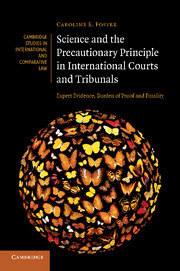 Science and the Precautionary Principle in International Courts and Tribunals
Science and the Precautionary Principle in International Courts and Tribunals Published online by Cambridge University Press: 11 April 2011
The exercise of the international adjudicatory function in disputes involving scientific uncertainty may meet its greatest test in relation to the allocation of the burden of proof. The traditional rule on the burden of proof has the potential to provide a high degree of predictability in international adjudication, yet there may arise cases where fairness calls strongly for an international court to reassess or adjust the allocation of the burden of proof. This may especially be so in the light of the precautionary principle. This chapter investigates the origins and the logic of the rule on burden of proof, establishing its parameters and the desirable directions for its future development. Chapter 6 then explores the potential for a modification in the articulation or application of the existing rules on burden of proof, in order to permit the reversal of the burden of proof to give effect to the precautionary principle.
The rule on the allocation of the burden of proof that is applied in international courts and tribunals is that the party making an assertion must prove that assertion: actori incumbit probatio. The rule derives from the rule applying in civil trials in Roman law: ei incumbit probatio qui dicit non qui negat. According to the maxim reus in exceptione fit actor, a party relying on an exception in the substantive law will attract the burden of proving the applicability of the exception or defence. Thus, as Rosenne has written:
Generally, in application of the principle actori incumbit probatio the Court will formally require the party putting forward a claim or a particular contention to establish the elements of fact and of law on which the decision in its favour might be given.
To save this book to your Kindle, first ensure [email protected] is added to your Approved Personal Document E-mail List under your Personal Document Settings on the Manage Your Content and Devices page of your Amazon account. Then enter the ‘name’ part of your Kindle email address below. Find out more about saving to your Kindle.
Note you can select to save to either the @free.kindle.com or @kindle.com variations. ‘@free.kindle.com’ emails are free but can only be saved to your device when it is connected to wi-fi. ‘@kindle.com’ emails can be delivered even when you are not connected to wi-fi, but note that service fees apply.
Find out more about the Kindle Personal Document Service.
To save content items to your account, please confirm that you agree to abide by our usage policies. If this is the first time you use this feature, you will be asked to authorise Cambridge Core to connect with your account. Find out more about saving content to Dropbox.
To save content items to your account, please confirm that you agree to abide by our usage policies. If this is the first time you use this feature, you will be asked to authorise Cambridge Core to connect with your account. Find out more about saving content to Google Drive.